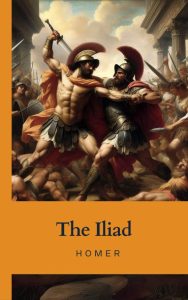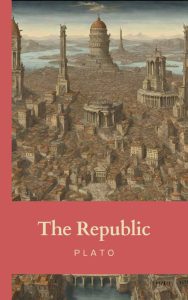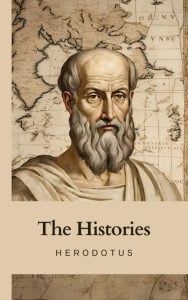
If you ask most people today why we ought to read the great works of ancient Greece, you might get puzzled looks or shrugs in response. After all, those dusty old tomes were written thousands of years ago – what relevance could they possibly hold for the modern world?
The foundations of Western culture and society were deeply shaped by the ancient Greeks and their seminal works in philosophy, science, mathematics, drama, and more. Virtually every facet of modern civilization owes a debt to the innovative minds of ancient Greece. Yet for many today, the classics of Greek literature can seem dry or inaccessible. What hidden gems might we find if we look beneath the dusty exterior? I believe the ancient Greeks have much to offer a modern reader – if we start with an open and inquisitive mind.
Some of the earliest and most influential exercises in rational thinking, political theory, and metaphysical questions came from Greek philosophers like Plato and Aristotle. Their discussions of ethics, reality, knowledge and human nature still resonate millennia later. By delving into their writings, we tap into the earliest roots of philosophical tradition in the Western world. We see big questions being asked and addressed for the first time, in a way that shaped all subsequent thinkers. The Greeks were not just focused on lofty metaphysics either – they laid important groundwork in fields like biology, astronomy and physics through early applications of the scientific method.
Of course, philosophy was hardly the only area where the Greeks excelled. Their epic poems, tragedies and comedies are still performed today and have enduring power to provoke thought and stir emotion. Figures like Homer and Sophocles addressed profound themes of fate, destiny, hubris and the human condition in ways that have fascinated audiences for thousands of years. On the page, their works transport us to colorful ancient worlds and prompt reflection on our own.
Where Would We Be Without The Greeks?
As dynamic as the ancient world was, it’s still startling to consider all that emerged from the minds of fifth century Greeks. Their contributions shaped virtually every field of human endeavor and set the foundation for modernity as we know it.
Philosophy
Let’s start with philosophy. As mentioned earlier, figures like Socrates, Plato and Aristotle essentially defined the subject as an academic discipline for the first time. Their scrutiny of ethics, politics, metaphysics and the natural world represented humankind’s earliest forays into rational thought. Centuries later, their works still illuminate debates in all these realms and many more.
Science
Science too owes the Greeks a huge debt. Not content with mythological explanations alone, thinkers like Pythagoras, Euclid and Archimedes embarked on early forms of mathematical, geometric and mechanical inquiry. Euclid’s Elements laid the ground rules of math that held for over 2000 years, while Archimedes’ principles of hydrostatics and other discoveries presaged the scientific method itself.
Politics
In terms of politics and government, thinkers from Plato to Xenophon dissected systems of rule, representation, justice and citizenship. The Athens of Pericles saw history’s first true democracy put into practice on a mass scale. And Thucydides’ famously detailed account of the Peloponnesian War endures as the seminal work of political history.
Drama
Even fields like Western theater, drama, poetry and literature feel the Greek penchant for beauty, storytelling and performance. Homer’s Iliad and Odyssey defined much of subsequent European literature and mythos. And tragic poets like Aeschylus, Sophocles and Euripides established dramatic conventions that Shakespeare himself built upon.
So in summary – from philosophy and science to government, city planning, Theater arts and beyond – these pioneering Greeks seem to have conceived of, explored and advanced nearly every discipline known today with their depth of imagination. Their lively debates and vigorous pursuit of knowledge laid a foundation still evident in our modern world. Without them, our own civilization may have taken far longer, or followed another course, to develop.
The World Built On Greek Shoulders
Beyond just providing rich themes and ideas to explore, the Greeks effectively established the intellectual foundation upon which Western civilization developed. Many of the genres, literary devices and techniques taken for granted today were first conceived by these pioneering authors.
Aristotle may have been the first to analyze what constitutes an effective tragedy or comedy in his Poetics. But it was the works of Aeschylus, Sophocles, Euripides and Aristophanes that introduced tropes like the heroic protagonist, twists of fate, dramatic irony and other storytelling rules later expanded on by Shakespeare, Ibsen and beyond.
Similarly, while Socrates didn’t directly write anything down, it was his influential digressive dialogical method, as portrayed by Plato, that inspired philosophical investigation and debate. The socratic method of questioning assumptions is still used widely in law, teaching and discourse generally.
Even dwelling in the epics of Homer allows you to step into the roots of subsequent literature as a whole. The Iliad told history’s first continuous narrative with developed characters. The Odyssey brought the first true “hero’s journey” and coming-of-age storyline that echoes through all tales of transformation thereafter.
So in a very real sense, these ancient thinkers comprise not just the beginning of Western thought but the genesis of the cultural frameworks we inhabit daily. By apprenticing ourselves to their works as the original masters, it’s possible to achieve deeper comprehension of the worldview that still underpins our modern experience. Everything from ethics to storytelling bears the fingerprints of Greece. That is the enduring power, and promise, of starting again with the ancients.
5 Essential Books to Start With
Now that you’re intrigued by the Greeks’ profound and widespread contributions, it’s time to dive into the source material. But with so many great works to choose from, it can seem daunting to know where to begin your journey. Here are 5 titles I’d recommend as the perfect starting point to get grounded in classical Greek thought:
The Iliad and The Odyssey by Homer

As the earliest surviving works of European literature, Homer’s epic poems are a must-read. Not only do they capture the human condition in gripping narratives that influenced storytelling for millennia, but they also established the DNA of subsequent Western myths featuring gods and heroes that permeated ancient Greek culture. The tales follow the epic Trojan War and its aftermath, dealing with eternal truths about war, destiny, and finding purpose that continue to resonate today.
The Apology by Plato

This seminal text succinctly yet profoundly recounts the infamous trial of Socrates through his compelling defense speech. It offers a primer on Socratic philosophy’s most important tenets like cultivating knowledge through questioning beliefs, honoring piety, and examining life’s meaning. Plato’s dialogue illustrates how reason can shed light even in the direst of circumstances.
The Republic by Plato

Though vast in scale, delving into this work challenges both mind and character with its nuanced exploration of what makes for a just and ethical society. Plato ambitiously theorizes on politics, psychology, education, and metaphysics through memorable dialogues. It remains deeply relevant for its insights into human nature and civilization.
Oedipus Rex by Sophocles

Oedipus Rex or Oedipus the King is a Greek tragedy that examines the limits of free will, inevitability, and what it means to be human with poetic resonance. Sophocles’ masterful drama brings to life timeless questions of fate, hubris, and moral responsibility with economy yet profundity. It demonstrates why he towers over antiquity as a pioneer of plot and characterization.
Histories by Herodotus

Herodotus’ pioneering inquiries on the Greco-Persian Wars functioned as both history and ethnography in their wide-ranging scope. They nourished the West’s earliest appetite for geopolitics, cultural exploration, and a more humanistic approach to chronicling the rise and fall of empires, nation-states, and civilizations. His lucid, judicious prose set the gold standard for investigative non-fiction.
Start with any of these and you’ll gain valuable exposure to history’s most influential thinkers. From there, the world of classical works awaits your exploration!
